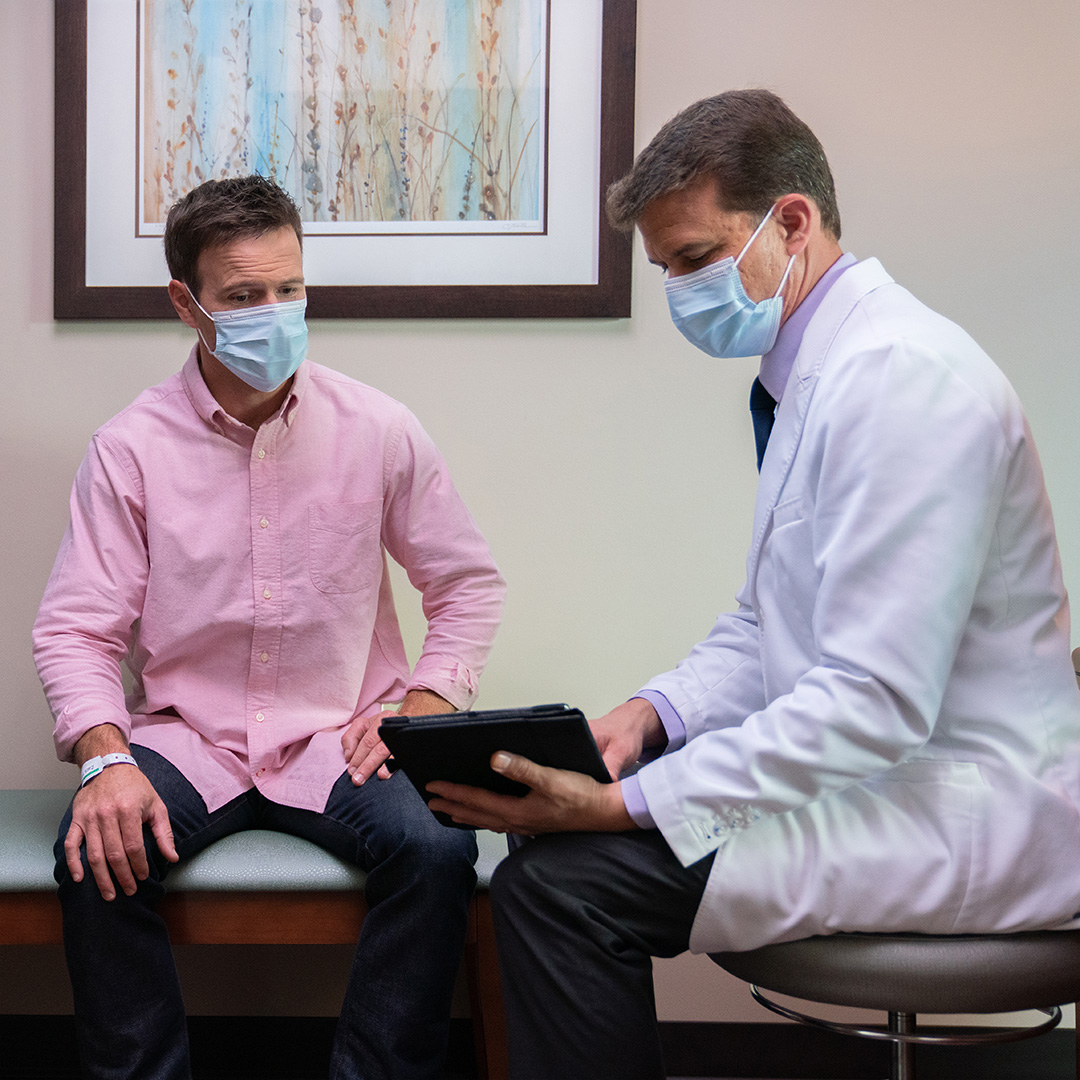


The clinicians with the Gastrointestinal (GI) Cancer Program at City of Hope Phoenix, are committed to offering state-of-the-art diagnostic tools and treatments options for patients with gastrointestinal cancer.
Our multidisciplinary team of board-certified medical oncologists, surgical oncologists, radiation oncologists and gastroenterologists work together with our supportive care providers and each patient to deliver quality clinical care with a patient-centered approach.
Our GI Cancer Program treats all gastrointestinal-related cancers, including anal, colon, esophageal, liver, pancreatic and stomach cancers, as well as neuroendocrine tumors.
After your diagnosis is confirmed, our GI Cancer Program care team will discuss your options with you and help you develop a personalized care plan tailored to your individual needs.
Cancer Treatment Centers of America® (CTCA) is now City of Hope®, joining forces to expand patient access to personalized, comprehensive cancer care.
Our doctors are trained and experienced in treating the wide range of gastrointestinal diseases. Treatments and diagnostic tools for most gastrointestinal diseases include the following, either alone or in combination:
For patients with advanced colorectal, appendix or stomach cancer, surgery to reduce the size of a tumor may be recommended in combination with hyperthermic intraperitoneal chemotherapy (HIPEC), a highly concentrated, heated chemotherapy treatment delivered directly to the abdominal cavity during surgery.
Within the GI Cancer Program, the gastroenterology team offers patients a number of minimally invasive techniques to diagnose and treat tumors and help reduce cancer-related symptoms. The team combines diagnostic test and state-of-the-art technologies with non-surgical techniques, such as colonoscopy to examine the inner lining of the colon and rectum, and endoscopic mucosal resection to remove abnormal tissue. The team also uses endoscopic ultrasound with fine-needle biopsy and radiofrequency ablation and other tools to treat esophageal, pancreatic, bile duct and colorectal cancers.
For patients with early-stage esophageal cancer or non-cancerous polyps in the intestines, our gastroenterologists may combine state-of-the-art technologies with non-surgical techniques, such as endoscopic mucosal resection, to remove abnormal tissue. They also use a wide range of tools, such as endoscopic ultrasound with fine-needle biopsy and radiofrequency ablation, to treat esophageal, pancreatic, bile duct and colorectal cancers.
The gastroenterologists with the GI Cancer Program at City of Hope Phoenix, are armed with an advanced diagnostic tool called GI Genius™, which uses artificial intelligence (AI) technology to help doctors more clearly and quickly identify colon polyps, adenomas and cancerous or pre-cancerous lesions.
In assisting the physician conducting the examination, GI Genius highlights areas of the colon that may look suspicious, including spots doctors may have missed, prompting them to take a closer look. A clinical trial that compared colonoscopy results with and without the device found that using GI Genius “significantly increases” the detection rate of adenomas during a colonoscopy.
GI Genius was the first AI device approved by the U.S. Food and Drug Administration for use during a colonoscopy, and our hospital was the first in the western United States to use it.

“This is a pioneering addition to our cancer-fighting arsenal. With the support of this new system, I am more empowered as a physician to help meet the needs of the patients and communities we serve.”
 Gagandeep Singh, M.D.
Chief of Surgical Oncology and Director of Surgical Services, City of Hope Phoenix
Gagandeep Singh, M.D.
Chief of Surgical Oncology and Director of Surgical Services, City of Hope Phoenix
 Toufic Kachaamy, M.D.
Chief of Medicine, City of Hope Phoenix
Toufic Kachaamy, M.D.
Chief of Medicine, City of Hope Phoenix
 Marnee Spierer, M.D.
Chief of Radiology, City of Hope Phoenix
Marnee Spierer, M.D.
Chief of Radiology, City of Hope Phoenix
 Vivek Iyer, M.D.
Medical Director of Pain Management, City of Hope Phoenix
Vivek Iyer, M.D.
Medical Director of Pain Management, City of Hope Phoenix
 Andrew A. Kassir, M.D., F.A.C.S., F.A.S.C.R., F.R.C.S.I.
Colorectal Surgeon
Andrew A. Kassir, M.D., F.A.C.S., F.A.S.C.R., F.R.C.S.I.
Colorectal Surgeon
The GI Cancer Program team at City of Hope Phoenix is committed to a multidisciplinary approach to care. After diagnosis, each patient is evaluated by a medical oncologist, who then builds the appropriate team based on the patient’s needs. Then the entire team, along with the patient, works together to develop a treatment plan designed to specifically for the patient. Throughout treatment and follow up, the team meets regularly to ensure that everyone is in alignment with the needs of the patient.
This collaborative, personalized approach allows us flexibility along the treatment journey, while also fostering an environment where experts in a variety of disciplines work together, all under one roof. New options may arise or different goals may be proposed during the course of treatment. We monitor the patient throughout treatment and adjust the care plan as needed.
As a patient at the GI Cancer Program, your team also works closely with other supportive care providers to help manage additional disease- and treatment-related side effects, such as nausea and vomiting. These supportive services may include a pain management physician, as well as naturopathic, mind-body and spiritual support providers.
Because of the digestive tract’s role in processing food and waste, many patients with gastrointestinal disease have difficulty with digestive function. That’s why nutritional support is a key component of the GI Cancer Program's approach. The program has a dedicated clinical dietitian on staff to work with patients in developing a healthy, balanced and appetizing nutrition plan. If patients become malnourished, our dietitian is also available to help them establish healthy lifestyle and eating habits to help improve their condition.

"We called the toll-free number to inquire about a second opinion. Even from that first phone call, I felt well cared for. There were no voice prompts to wade through or shuttling from one person to the next. After meeting with the care team, I had a CT scan and was walked through a proposed treatment plan a day or so later. "
Our oncologists are committed to improving treatment options for gastrointestinal cancer patients. As part of that commitment, the GI Cancer Program offers qualified patients carefully selected clinical trials in studying new treatment approaches like immunotherapy for pancreatic cancer and other innovative research.
Although clinical trials are not available to all patients, they may offer some patients options that would otherwise be unavailable to them. Your care team will discuss whether you qualify for any of our ongoing clinical trials, and if so, help you enroll.
Learn more about our clinical trials program and which trials are available
For general questions, contact an Oncology Information Specialist at 888-841-9129.
New patients: 866-687-3479
Existing patients: 888-357-2822
New patients: 866-687-3479
Existing patients: 480-530-4700
New patients: 866-687-3479
Existing patients: 623-932-8960
Patients: 480-530-4200
Offering clinical trials on new and emerging cancer treatment options.
View our clinical trials